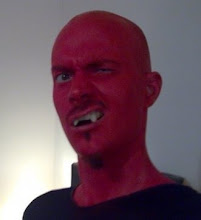Predators
Right from the off Predators shows promise. Adrian Brody gains consciousness in freefall, his ‘chute automatically ejecting thanks to what looks like, at a glance, a predator tech altometer. Once on the ground in thick jungle, the familiar jungle-drum theme from the original plays softly as the camera pans across the tree canopy from below. For the rest of the film the score evokes orchestral pieces from 80s classics in a way that works, rather than simply a display of nostalgia for the sake of it. The full first half hour of the film doesn’t involve any action, instead concentrating on the disparate warriors, warily uniting and trying to fathom how they all came to be dropped from the sky into unending jungle.
The characters themselves are mainly thinly sketched stereotypes - Danny Trejo as a Mexican gang enforcer, a Chechnyan soldier, a quiet, enigmatic yakuza, a death-squad soldier from Sierra Leone, a mouthy death row con with a shiv, an Israeli Defence Force sniper, an incongruous doctor and indie darling Adrian Brody as the hero.
The premise is contained within the trailer, these people have been pulled together to be hunted and as the movie progresses they are picked off one by one; the group are all hunters of people back on Earth and so make for challenging prey.
A film about a group being hunted inevitably makes Predators a chase movie, but the situations that crop up as the predators wheel out a variety of traps and an encounter with another survivor (a scene stealing cameo by Laurence Fishburne) are more than enough to keep you hooked. Though the stereotypical characters are only one of a number of genre tropes to be found, Predators makes use of them in all the right ways. Any criticisms that can be made at the sophistication may be confusing the franchise with the ‘hard’ sci-fi horror of Alien - Predator, lest we forget, featured a cigar chomping wrestler alongside Arnie in one-man-army mode and use of the word “motherfucker” being a key recurring feature.
Though the characters are on the stock side the personality clashes, double-crosses and betrayals do enough to have you caring about at least some of them, and they are sometimes used well - when the yakuza finds a samurai sword, it’s enough to provoke a roll of the eyes, but a one-on-one blade fight with a predator ends in a scene almost poetic, its wind-blown grass echoing classics samurai movies.
It’s hardly going to win any awards and sci-fi action films have been done better, but Predators is not only a decent genre offering but a glimpse at the possibilities of relaunching fallen franchises, they don’t have to go the way of Aliens vs. Predator.
Twilight: Eclipse
I’m certainly not in the target market for the Twilight franchise; despite the promise of a vampire/werewolf tussle (the Underworld films already demonstrate how this isn’t an automatic winning formula) but it was the promise of this clash that almost had me looking forward to this third installment. The trailer mixed up the usual earnest smouldering between the three corners of the supernatural love triangle, Bella, Edward and Jacob with hints of a vampire army on the march to Alaska, facing the wibbly alliance of the Cullen vampire clan and Native American werewolves. What we actually get is mixed.
There’s plenty of rivalry between the boys as they begrudgingly work together to protect Bella, and while the end of New Moon seemed to see her choose Edward pretty resolutely as her love, here it’s as if Jake’s dogged insistence that she feels something for him actually conjures those feelings into existence. This time however the central plot has little to offer those who don’t totally believe in it. New Moon offered plenty of laughs, however unintentional, but Eclipse’s slightly moodier tone somehow dampens any hysterical aspects and deadens the impact of camp.
Unfortunately the sideshow of the big fight fails to deliver. We are told that newly created vampires, newborns, are stronger and faster than normal thanks to their sudden bloodlust, though they can be beaten with skill and strategy. Much was made in New Moon of the difficulty vampires have in dying; as the sun creates glitter rather than flames in its interpretation, it was only the Voltari, the ridiculously camp vampire aristocracy, could bring a vampire’s immortality to an abrupt end. However, it seems that vampires are actually made out of glass or crystals and can be smashed to bits fairly easily, perhaps because they’re ‘new’. Whatever the reason it seems to deflate a key plot point in New Moon. Another moment which hampers immersion is Bryce Dallas Howard in the role of Victoria. There’s nothing wrong with her aside from the fact that the character was previously played by Rachelle Lefevre - it’s not a big issue but still jars.
After being pleasantly surprised by the first installment and having enough to enjoy from the second from the overwrought depictions of Bella’s mopiness, Jake’s shirt-losing abilities and Michael Sheen’s daft costume, I found Eclipse to be a let down with the action too short and infrequent and the main struggle for Bella’s affections stretched a little thin after three movies of it.
Still much better than a tale of obsessed teen romance has any right to be, the third part is nevertheless somewhat of a dip. Hopefully the fourth in the series will see the story branch out somewhat.

